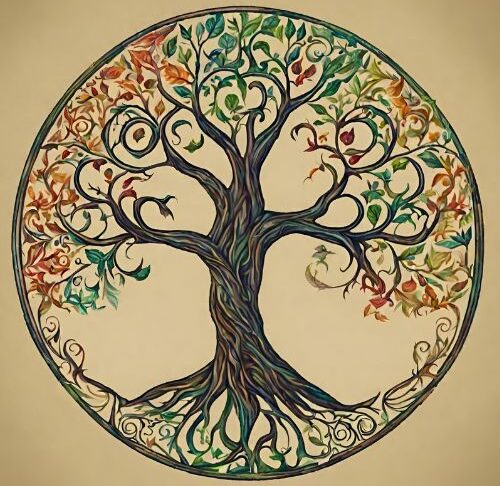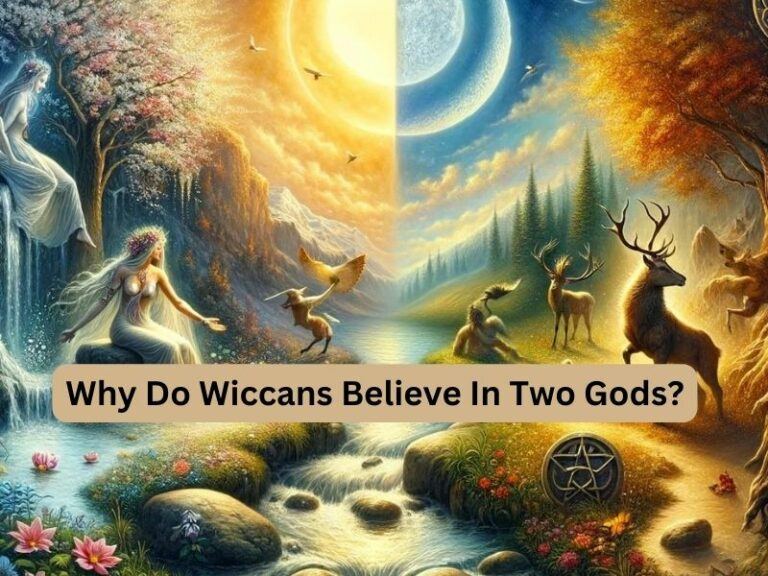Wiccans believe in two main gods, the God, and the Goddess because they represent the balance of male and female energies in the world. Wiccans see nature as a place where everything is connected and opposites work together to create harmony. The Goddess stands for things like creation, fertility, and the moon, while the God represents the wild, hunting, and the sun. By honoring both the Goddess and the God, Wiccans celebrate the balance that makes the world work, from the way life begins and ends to the way day and night take turns. This idea of a divine feminine and masculine is a key part of what Wiccans believe and helps guide them in understanding the world and their place in it.
The Harmony of Opposites
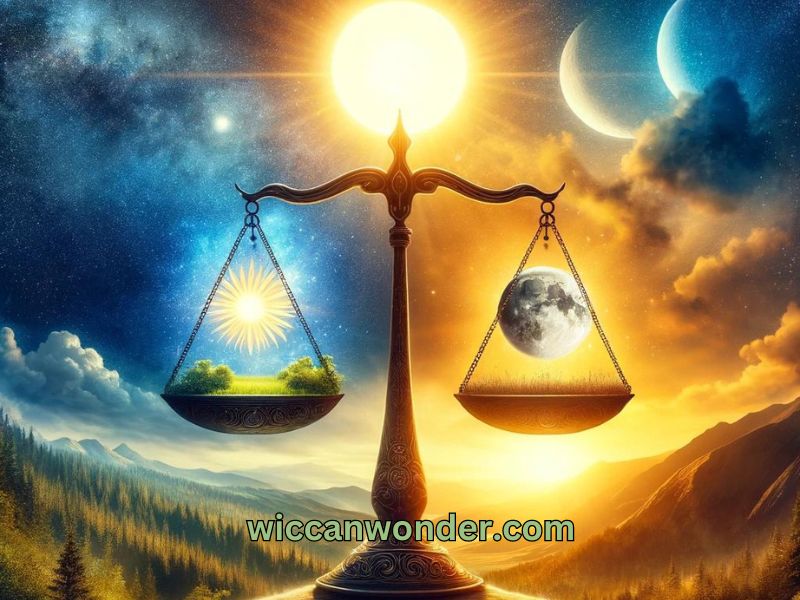
A key belief in Wicca is that opposites work together in harmony and that everything in the world is linked and balanced.
In the natural world, there is balance all around: day and night, summer and winter, life and death. You need one for the other to exist. Wiccans believe this balance is the center of how the universe works—not one side being more important than the other, but how they work together to make something whole.
The changing seasons are a great example of this balance. The bright, busy feeling of spring and summer, when everything is blooming and coming to life, is evened out by the calm, restful feeling of fall and winter when things die back and become dormant.
Wiccans believe this balance of opposites is sacred. They honor it in their rituals. It helps them remember that everything has its place and reason for being and that there’s a natural flow to life that we’re all part of.
The Divine Duo
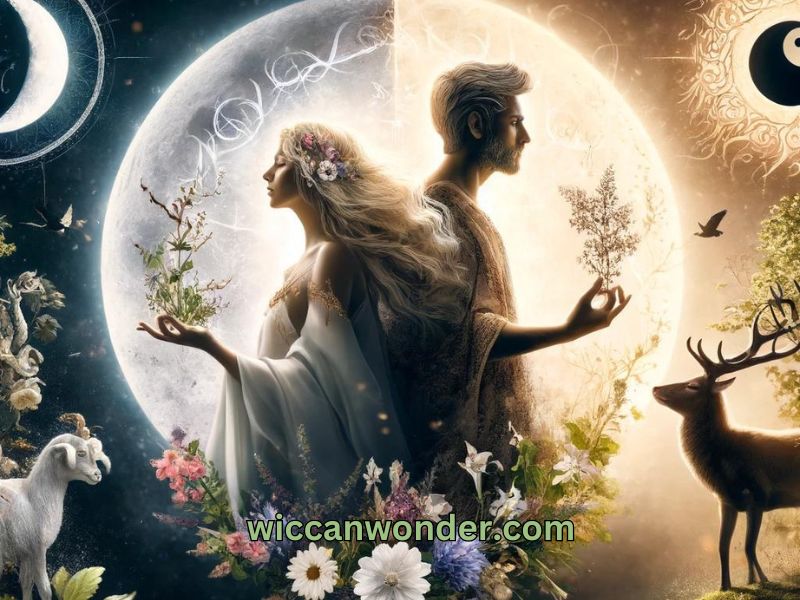
The Wiccan religion centers around two main gods: the Goddess and the God. These figures stand for the different sides of nature. The Goddess represents the caring, creative side, while the God represents the wild, untamed side.
The Goddess represents things that bring life and growth, such as the moon, the tides, and the fertility of the earth. Her energy can be felt in blooming flowers, the birth of baby animals, and the inner wisdom that guides you. She is like a loving mother, always looking after the natural world.
The God, on the other hand, represents nature’s rougher, more powerful parts. He is often viewed as a hunter, protector, and symbol of the sun’s strong energy. You can sense his presence in the warmth of a summer day, the thrill of a chase, and the courage of a warrior. He is the wild spirit that moves through forests and fields.
To better understand the different roles and traits of The Goddess and The God in Wicca, consider the following comparison.
🌒 Comparison of The Goddess and The God 🌞 |
||
|---|---|---|
| Aspect | The Goddess | The God |
| Symbolizes | Fertility, creation, the moon 🌙 | The wild, hunting, the sun ☀️ |
| Represents | Life and growth, inner wisdom, nurturing 🌱 | Strength, courage, the cycle of life and death 💪 |
| Associated with | Nature’s renewal, water elements, earth 🌍 | Forests, animals, fire elements 🔥 |
| Seasons | Spring and Summer (growth and fertility) 🌸 | Autumn and Winter (harvest and rest) 🍂 |
| Times of Day | Night, the moon phases 🌖 | Day, solar phases 🌞 |
| Brought to You by “wiccanwonder.com” | ||
In Wiccan beliefs, the Goddess and the God together form the complete divine energy in nature. They are two halves of a whole, balancing each other perfectly.
Learning about these two gods and how they represent different aspects of the natural world has been quite fascinating.
Balance is Key
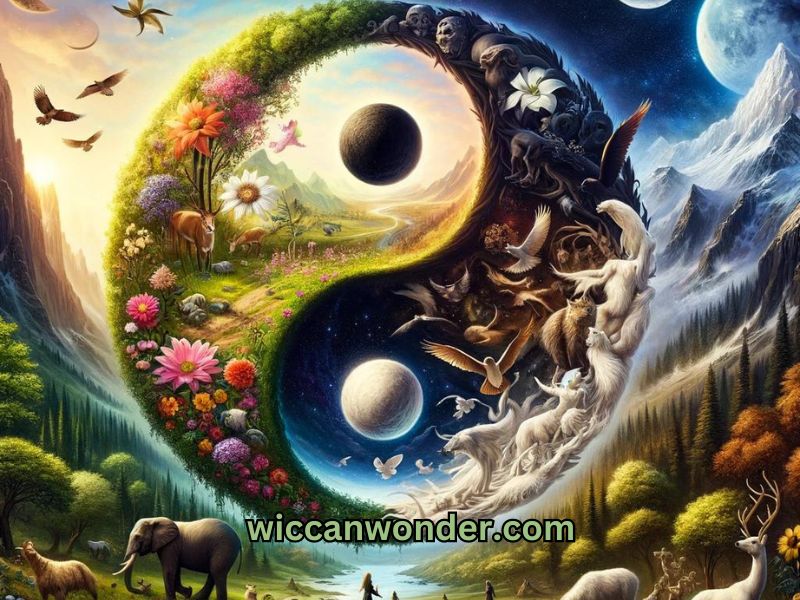
Balance is very important in Wicca. It’s not just about having two gods, the Goddess, and the God, but about how they work together as two parts of the same whole.
Wiccans don’t see the Goddess and the God as separate beings but as two faces of the same sacred energy. They’re like two sides of a coin, or the yin and yang symbol – opposites that fit together perfectly. The Goddess brings life and growth, while the God brings change and transformation. Together, they make the balance that keeps the universe in harmony.
This idea of balance is part of all Wiccan beliefs and practices. It’s about respecting nature’s cycles, like the changing seasons or the phases of the moon. It’s about accepting both the good and the bad in life, knowing that you can’t have one without the other. And it’s about trying to find balance in your own life, in your relationships, and in your connection with the world around you.
Life isn’t always easy or perfect, but there’s a natural order to things. By honoring the Goddess and the God, Wiccans try to live in a way that follows the universal balance that is the foundation of everything.
Many Paths, One Journey
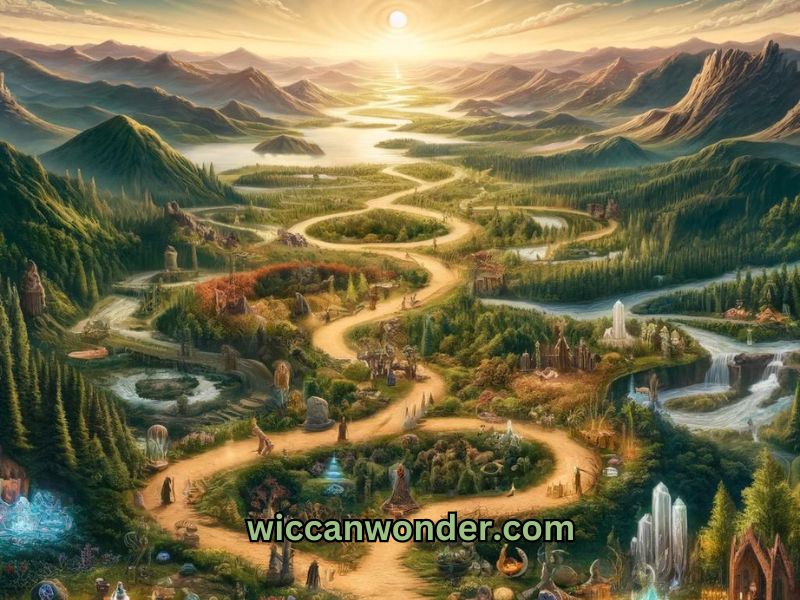
Wicca is a varied religion with many different traditions and paths. There’s no single “right” way to be a Wiccan.
While most Wiccans honor the Goddess and the God, the names and traits of these gods can be quite different from one tradition to another. Some Wiccans might work with gods and goddesses from old belief systems, like the Greek or Norse gods.
Some Wiccan traditions also have a specific focus or theme. Dianic Wicca centers around the worship of the Goddess and the divine feminine.
Eclectic Wicca takes ideas from many different sources and lets followers make their own unique path.
This variety is a big part of what makes Wicca special. It’s a religion that encourages people to find their own truth and connect with the divine in a way that feels right to them. No one tells them what to believe or how to practice—it’s all about your own journey of self-discovery.
Although there are many different paths within Wicca, they all lead to the same place: a deeper understanding of yourself, the world around you, and your place in it.
Finding Your Connection
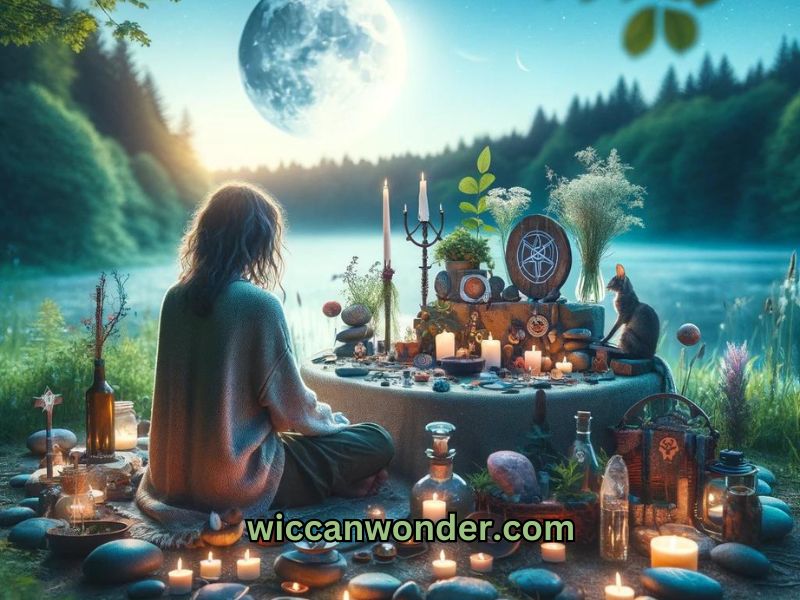
One thing becomes clear: Wicca is a deeply personal spiritual path. While there are some common beliefs and practices, like honoring the Goddess and God and celebrating the cycles of nature, how you connect with the divine is ultimately up to you.
Wicca is all about finding your own way to experience the sacred. For some people, that might mean spending time in nature, meditating under the moon, or creating an altar with meaningful objects. For others, it might involve practicing magic, reading tarot cards, or participating in group rituals.
The key is to explore what feels right to you. Wicca encourages you to trust your intuition and follow your heart. If something doesn’t resonate with you, that’s okay – you don’t have to force it. This path allows you to create a spirituality that is uniquely yours.
One of the ways Wiccans connect with the divine is by developing a personal relationship with the Goddess and the God. Not blindly worshipping some distant, unknowable beings –but as guides, friends, and allies on your journey. You might talk to them in your prayers, leave offerings for them, or feel their presence in the world around you.
Finding your connection to the divine is an ongoing process. It does not happen overnight, but rather a gradual unfolding that happens as you open yourself up to new experiences and insights. And that’s okay—the journey is just as important as the destination.
Wicca is about finding a way to live in harmony with yourself, others, and the natural world. It’s a path of self-discovery, of learning to trust one’s own wisdom and intuition. While it may not always be easy, Wiccans believe it can lead to profound growth, healing, and transformation.
Frequently Asked Question
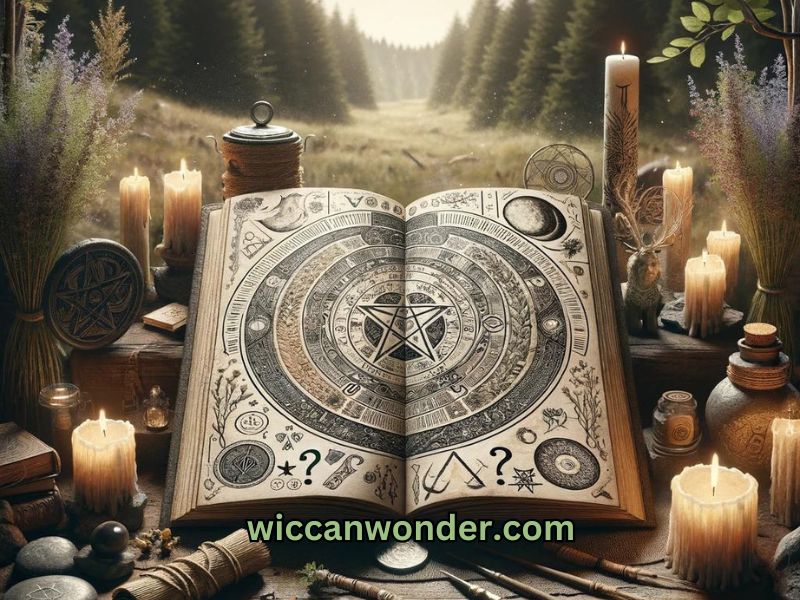
Q: Do Wiccans always worship two gods?
A: While most Wiccans honor both a Goddess and a God, there’s actually a lot of variety in Wiccan practice. Some traditions focus more on one deity than the other, and some Wiccans even work with gods from different cultures and pantheons. The key is finding a balance that feels right and meaningful to you.
Q: What are some names for the Wiccan God and Goddess?
A: The names of the Wiccan deities can vary a lot depending on the tradition and the individual practitioner. Some common names for the Goddess include Diana, Gaia, and Isis, while the God is often called Cernunnos, Pan, or Herne. But these are just a few examples – there are many, many more.
Q: How do the Goddess and God relate to each other?
A: In Wiccan beliefs, the Goddess and the God are two halves of a whole, representing the balance of feminine and masculine energies in nature. They are equal in power and importance, and their interaction is what creates and sustains life. Some Wiccans see them as literal beings, while others view them as symbolic archetypes.
Q: Can you have a personal relationship with both the Goddess and the God?
A: Absolutely! Many Wiccans develop close, personal relationships with both deities through prayer, meditation, and ritual. They may talk to the Goddess and God, leave offerings for them, or simply feel their presence in the world around them. Building a connection with these divine beings is an important part of Wiccan spiritual practice.
Q: Are there Wiccan traditions that focus more on one deity than the other?
A: Yes, some Wiccan traditions do emphasize one deity over the other. For example, Dianic Wicca is a feminist tradition that focuses primarily on the Goddess and the sacred feminine, while the Alexandrian tradition places a bit more emphasis on the God. However, most Wiccan paths honor both deities equally.
Key Learning Points:
- Wicca, a nature-based religion, emphasizes the balance between masculine and feminine energies.
- Most Wiccans revere a Goddess and a God, representing complementary forces in the universe.
- Specific names and characteristics of these deities can vary depending on the Wiccan tradition.
Is there anything about Wicca that you find especially interesting or puzzling? Please leave me a comment – I’d love to hear your thoughts!
Blessed Be
Taianne
Share the Love

Welcome to WiccanWonder.com!
I’m Taianne, your guide on this enchanting journey into the realm of Wicca and witchcraft. Inspired by the magical stories of pop culture, I’ve transitioned from a casual fan to a dedicated explorer of Wicca’s true nature—a nature-based religion celebrating the divine, the cycles of nature, and living harmoniously with the earth. Through WiccanWonder.com, I aim to demystify Wicca, separating fact from fiction, and inviting others to explore its rich traditions and practices alongside me. As a fellow seeker, I’m here to share insights, discoveries, and open a space for dialogue and learning. Whether you’re new to Wicca, a seasoned practitioner, or simply curious about magic and spirituality, your presence enriches our journey. Let’s explore the wonder of Wicca together.
Feel free to contact me at Taianne@wiccanwonder.com
Blessed be!
